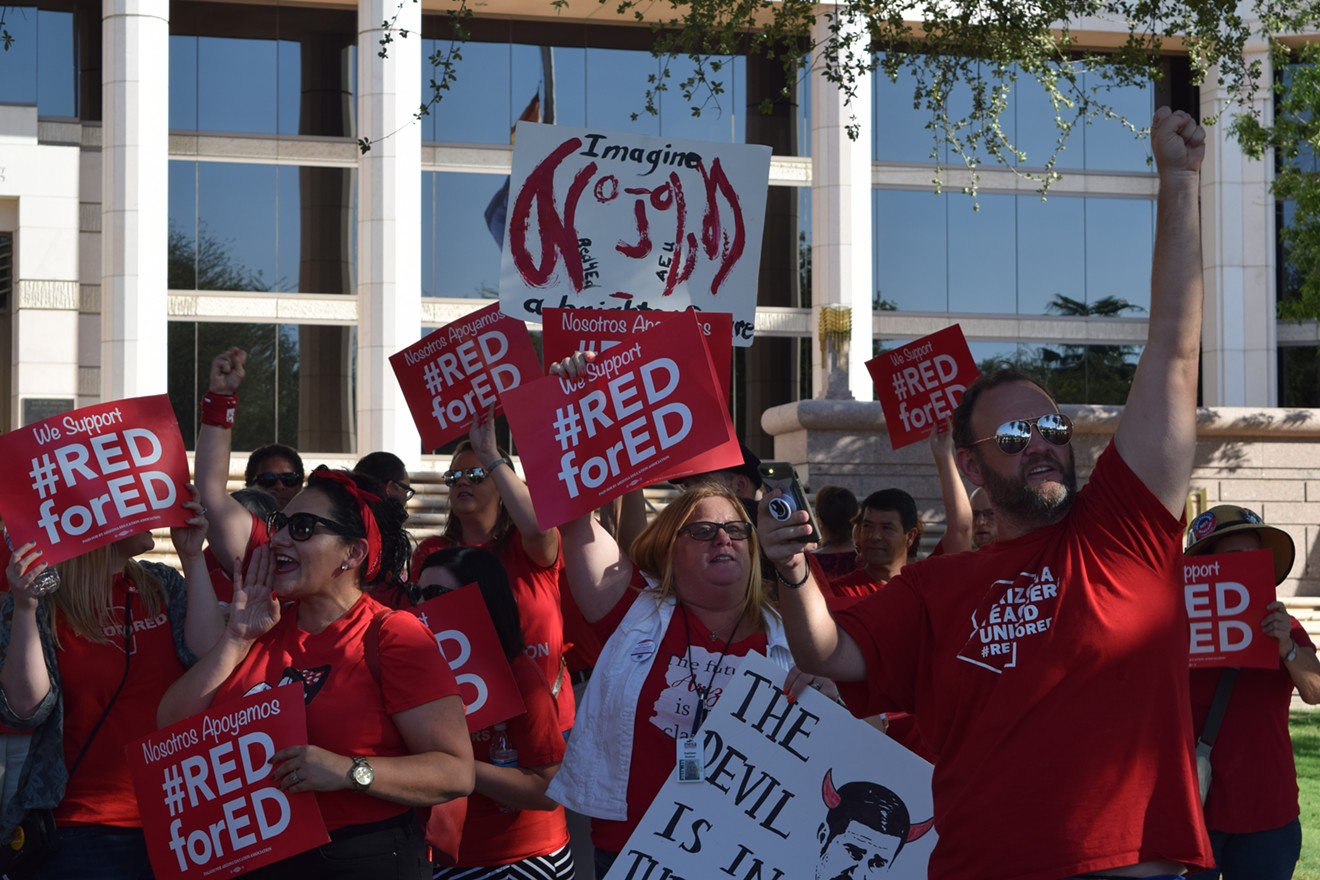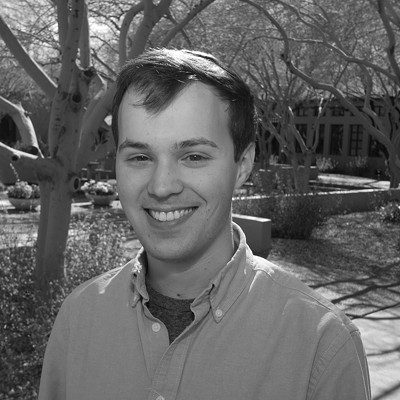The Arizona Supreme Court kicked the school-funding tax measure known as Proposition 207 off the ballot last week, citing misleading language in a 100-word initiative summary that was presented to petition-signers. The ballot measure language misstated how big the tax increase would be and which taxpayers would be affected, the court ruled.
Teachers with the #RedForEd movement for increased pay and school funding were furious. They vowed to "remember in November."
The activist-educators intend to hold elected officials accountable for their role supporting or denying increased funding for schools. They've thrown their support behind several candidates for public office this year who are friendly to their cause, and aim to kick others out of office. Now, their hit list also includes two justices of the Arizona Supreme Court.
Justices must stand for a retention election two years after their initial appointment by the governor, and every six years thereafter. This November, justices Clint Bolick and John Pelander are on the ballot in a yes-or-no referendum that will determine whether they will keep their jobs.
A website for the grassroots #RedForEd organization Arizona Educators United shows images of all seven justices with an "X" overlaid on Bolick and Pelander.
The website states, "Remember these names and vote accordingly ..."
Music teacher Noah Karvelis, a lead #RedForEd organizer, told Phoenix New Times in a text message that "the retention elections will be a focus."
"We of course have several areas that we are working on, but all citizens need to realize that they have a voice in these retention elections," Karvelis wrote. "The Supreme Court justices should be accountable to the people and what happened with Prop 207 will certainly not be forgotten easily."
After this spring's statewide strike, teachers in the #RedForEd movement pivoted to support the Invest in Education Act. The ballot measure was meant to circumvent the Legislature by raising taxes on wealthy Arizonans in order to funnel approximately $689 million to schools annually.
Tax-averse Arizonans were alarmed, and a committee funded by the Arizona Chamber of Commerce challenged the measure in court. Although the teachers won the initial skirmish in Maricopa County Superior Court, the Arizona Supreme Court reversed the lower court's decision on August 29.
As of early Wednesday afternoon, it was still unknown how each justice voted during the Invest in Ed decision. The court has not released a full opinion, issuing only a brief order knocking the measure off the ballot.
Karvelis acknowledged that Bolick or Pelander may have argued in favor of keeping Invest in Ed on the ballot.
"That's why right now it just says, 'Remember these names and vote accordingly,'" he wrote. "We want educators and education supporters to be aware of these elections and the people in them and to then decide how they want to vote."
Bolick told New Times on Wednesday that shortly after news broke of the Invest in Ed ruling, friends sent him screenshots of Facebook posts from people suggesting that they vote him out along with Pelander.
From Bolick's point of view, targeting a justice in a retention election because of a decision sets an "adverse precedent."
"I certainly can't be critical of anyone who is exercising their franchise or their free speech rights," Bolick said in an interview. "Having said that, I think that our system is set up to be a merit system, and that's how judges are chosen, and I think that's ordinarily the main consideration for retention."
Arizona Governor Doug Ducey appointed Bolick to the Supreme Court in 2016. An independent, Bolick won out over six other candidates, all of them appellate judges, who were sent to the governor's desk by a judicial nomination commission.
A former vice president of litigation for the conservative Goldwater Institute, Bolick had a reputation for his libertarian legal activism. He co-founded the Washington, D.C., nonprofit Institute for Justice, which takes on legal cases to roll back perceived government overreach and burdensome regulations.
While there's probably not much shared ideology between Bolick and the #RedForEd organizers – he was a legal warrior for school choice and vouchers – Bolick said that he can empathize with them. He once had an initiative struck from the ballot in 2010 while working for the Goldwater Institute.
"It's painful to put that type of effort into getting something on the ballot only to have it taken off the ballot," Bolick said. He quickly added, "Certainly, I did not mount a retention campaign."
Bolick is also a member of the Federalist Society, a highly influential network of conservative lawyers that has shaped the judiciary and influenced the recent Supreme Court nominations of Neil Gorsuch and Brett Kavanaugh.
He would not disclose the vote breakdown for the Invest in Ed decision, but said that the court tries to release election-related decisions quickly. "The mystery should not last long," Bolick said.
Pelander joined the bench in 2009 after he was appointed by then-governor Jan Brewer from the court of appeals in Tucson. He declined comment for this article.
Ironically, Pelander became the target of a conservative campaign to remove him from the court in the 2012 retention election, but voters chose to keep him. The right-wingers were angry because Pelander had voted in favor of allowing Proposition 121 to stay on the ballot that year. The measure would have eliminated Arizona's two-party primary system, but failed by a margin of 67 to 33 percent.
Paul Bender, a professor of law and dean emeritus at Arizona State University's Sandra Day O'Connor College of Law, said in an interview that he disagreed with the court's ruling on Invest in Ed. At the same time, he praised Bolick and Pelander as "high-quality" jurists.
Bender argued that targeting them in a retention election would be a mistake.
"If you’re going to start not retaining people because you disagree with their decisions in particular cases, and that starts working, then you’re really interfering with the independence of the court," Bender said.
Bender considers Bolick to be a fairly close friend, and although he disagreed with much of Bolick's legal activism at the Goldwater Institute, he said that Bolick has proven to be a thoughtful justice. "Now that he is on the court, he is really – as far as I can tell – trying to do things correctly," Bender said. "I think he’s trying not to be political."
But in the eyes of #RedForEd teachers, the whole court may be tied to a decision that killed Invest in Ed. Around two dozen educators and supporters wearing red gathered outside of the court's chambers last Thursday. At one point, they chanted, "Let the people vote."
Ducey is another villain to them. And because he has the power to appoint justices, the retention election is a convenient proxy war in the fight against the governor.Educators protest the #InvestInEd decision at the Arizona Supreme Court pic.twitter.com/ZyTFEJPmIi
— Joseph Flaherty (@flahertyjoseph) August 31, 2018
Since appointing Bolick, Ducey has appointed two other justices to the high court thanks to a 2016 law that expanded the bench from five to seven judges.
Derek Harris, another #RedForEd organizer, described the situation as a plot by the governor to pack the court with conservative judges. He suggested that the new justices contributed to the failure of Invest in Ed. "Them being there was not a pro-education decision on Ducey’s part," Harris said in an interview.
The governor's race and the State Senate elections are more consequential than the Supreme Court retention elections, he said. But he maintained that the Invest in Ed ruling showed a partisan side to the court because the justices took the choice away from voters.
"It was an undemocratic move," Harris said. "It was partisan politics, purely."
Educators criticize Ducey's 20 percent teacher pay raise plan for lacking a sustainable revenue source. They also blame Ducey for ignoring a multimillion-dollar gap in education spending that has never been fully restored after Arizona made deep cuts during the 2008 recession.
At an education forum on Tuesday featuring Democratic candidates David Garcia and Kathy Hoffman, who are running respectively for governor and superintendent, a #RedForEd organizer drew a direct connection between Ducey's appointees to the Supreme Court and the Invest in Ed decision.
"Now we know that these folks are running his agenda," Garelli said in her introduction to the event. "And this is not a pro-public education agenda."














